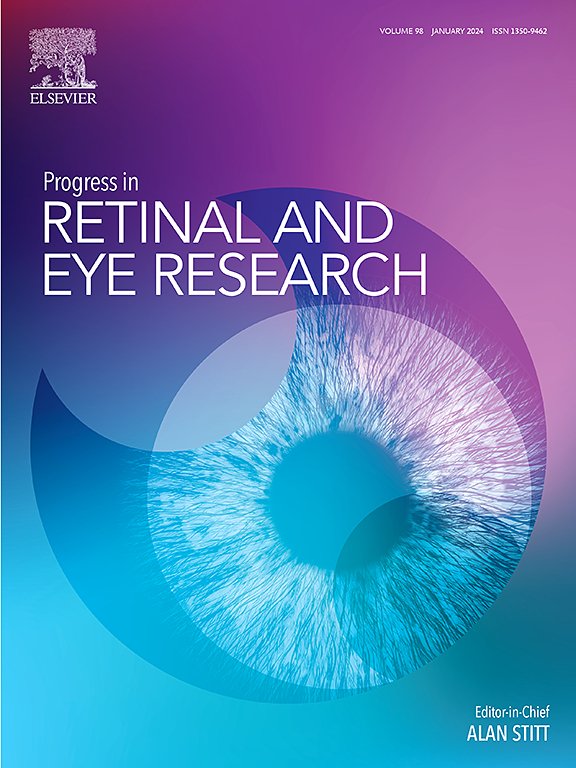The neuroimmune interface in retinal regeneration
IF 14.7
1区 医学
Q1 OPHTHALMOLOGY
引用次数: 0
Abstract
Retinal neurodegeneration leads to irreversible blindness due to the mammalian nervous system's inability to regenerate lost neurons. Efforts to regenerate retina involve two main strategies: stimulating endogenous cells to reprogram into neurons or transplanting stem-cell derived neurons into the degenerated retina. However, both approaches must overcome a major barrier in getting new neurons to grow back down the optic nerve and connect to appropriate visual targets in environments that differ significantly from developmental conditions. While immune privilege has historically been associated with the central nervous system, an emerging literature highlights the active role of immune cells in shaping neurodegeneration and regeneration. This review explores the neuroimmune interface in retinal repair, dissecting how immune interactions influence glial reprogramming, transplantation outcomes, and axonal regeneration. By integrating insights from regenerative species with mammalian models, we highlight novel immunomodulatory strategies to optimize retinal regeneration.
视网膜再生中的神经免疫界面
由于哺乳动物的神经系统无法再生失去的神经元,视网膜神经变性会导致不可逆的失明。视网膜再生包括两种主要策略:刺激内源性细胞重编程为神经元或将干细胞来源的神经元移植到退化的视网膜中。然而,这两种方法都必须克服一个主要障碍,使新的神经元沿着视神经生长,并在与发育条件明显不同的环境中连接到适当的视觉目标。虽然免疫特权历来与中枢神经系统有关,但新兴文献强调了免疫细胞在形成神经变性和再生中的积极作用。这篇综述探讨了视网膜修复中的神经免疫界面,解剖了免疫相互作用如何影响神经胶质重编程、移植结果和轴突再生。通过整合再生物种与哺乳动物模型的见解,我们强调了优化视网膜再生的新免疫调节策略。
本文章由计算机程序翻译,如有差异,请以英文原文为准。
求助全文
约1分钟内获得全文
求助全文
来源期刊
CiteScore
34.10
自引率
5.10%
发文量
78
期刊介绍:
Progress in Retinal and Eye Research is a Reviews-only journal. By invitation, leading experts write on basic and clinical aspects of the eye in a style appealing to molecular biologists, neuroscientists and physiologists, as well as to vision researchers and ophthalmologists.
The journal covers all aspects of eye research, including topics pertaining to the retina and pigment epithelial layer, cornea, tears, lacrimal glands, aqueous humour, iris, ciliary body, trabeculum, lens, vitreous humour and diseases such as dry-eye, inflammation, keratoconus, corneal dystrophy, glaucoma and cataract.

 求助内容:
求助内容: 应助结果提醒方式:
应助结果提醒方式:


